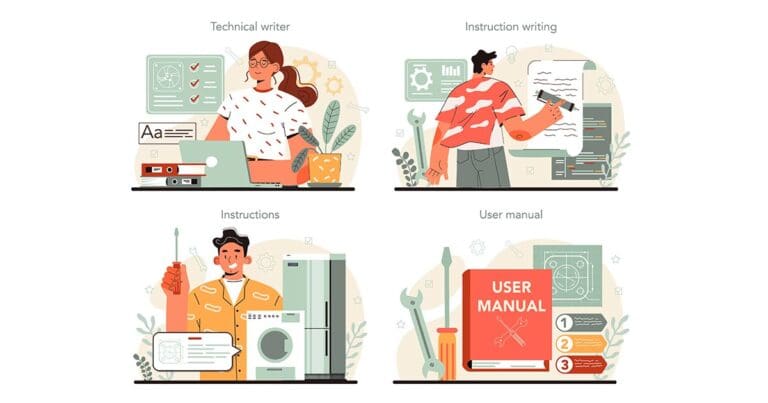What is Technical Writing? Everything You Need To Know

In a world where jargon fills our news feeds and every industry seems to have its own secret code, technical writing emerges as an unsung hero, bridging the gap between complex concepts and everyday understanding.
For employers, having a skilled technical writer on your team is paramount in ensuring smooth internal and external communication, enabling all to grasp even the most complex industry-specific terminologies.
Meanwhile, for job seekers, mastering this skill can open doors to numerous opportunities as the demand for good technical writers continues to rise in the dynamic professional landscape.
So, what exactly is technical writing, and why is it in such high demand?
What is technical writing?
Technical writing is designed to convey intricate information in a manner that is easily understood by a target audience. It comprises creating detailed documentation, such as blogs, white papers, infographics, user manuals, guides, and how-to instructions, primarily revolving around technical or specialized fields.
Unlike other kinds of writing, technical writing doesn’t aim to entertain or express personal views, but rather, its mandate is to engage, educate, and instruct.
It emphasizes clarity, precision, and efficiency, focusing on delivering information in a concise, structured, and objective way.
11 examples of technical writing
Examples of technical writing include user guides, software documentation, technical reports, tutorials, marketing content, and infographics.
- User guides
- White papers
- Software documentation
- API documentation
- Standard Operating Procedures (SOPs)
- Technical reports
- Tutorials
- Online help systems
- Training materials
- Marketing content
- Infographics
1. User guides
These are manuals that accompany products or services, providing step-by-step instructions on how to use them.
They are commonly used for software, household appliances, and gadgets.
A good user guide should be easy to follow, with clear and concise instructions accompanied by visuals to aid understanding.
2. White papers
White papers are authoritative reports or guides that provide in-depth information on a specific topic or industry.
They are usually used for marketing purposes, showcasing a company’s expertise and thought leadership within their niche.
A well-written white paper should be backed by research, data, and statistics to support its claims.
3. Software documentation
This type of technical writing involves creating user manuals, training materials, and release notes for software applications.
It aims to help users understand the features and functionalities of a particular software product or service.
4. API documentation
API (Application Programming Interface) documentation is a set of instructions and guidelines for developers on how to use an API.
It is crucial in enabling seamless integration between different software systems.
5. Standard Operating Procedures (SOPs)
SOPs are detailed instructions that outline the steps required to complete a task or process within an organization.
They are used to ensure consistency, efficiency, and compliance with industry standards.
6. Technical reports
Technical reports consist of detailed information and analyses on a specific topic, often created for scientific or engineering purposes.
They present findings, recommendations, and conclusions based on thorough research and data analysis.
7. Tutorials
Tutorials are instructional materials that guide users on how to perform specific tasks or achieve a particular goal.
These could be in the form of written guides, videos, or interactive courses. They are commonly used for software, coding, or online tools.
8. Online help systems
Digital resources containing FAQs, user forums, and tutorials designed to assist users in navigating through software applications.
They are especially useful for troubleshooting and providing quick solutions to common user problems.
9. Training materials
Educational materials are created to train individuals on new software, processes, or equipment.
These could include videos, manuals, presentations, or interactive courses.
Training materials should be engaging, precise, and easy to follow for effective learning.
10. Marketing content
Technical writing plays a significant role in creating marketing content such as brochures, case studies, and product descriptions.
These materials aim to inform potential customers about the features and benefits of a product or service.
11. Infographics
Visual representations of complex data and information that are easier to digest and understand.
They are created using a combination of images, charts, and text to convey information in a visually appealing manner.
Examples of technical writing jobs
Technical writing jobs include technical writers, content developers, instructional designers, and user experience writers (UX writers), and information developers.
Technical Writer
Responsible for creating, editing, and managing various technical documents for a company or organization.
This could include user manuals, training materials, reports, and more.
They work closely with subject matter experts to gather information and ensure accuracy in their writing.
Content Developer
A Content Developer is tasked with developing content strategies and creating digital resources, which can range from blogs and webinars to e-books.
Their role involves researching, organizing, and generating content that attracts and retains an audience, while also promoting the brand or product effectively.
They employ creative and technical skills to produce content that is engaging, informative, and aligned with the company’s objectives.
Instructional Designer
An Instructional Designer designs and develops educational materials and training courses using various learning theories and instructional techniques to facilitate effective learning.
They are responsible for creating a curriculum that is engaging, interactive, and tailored to the learner’s needs, ensuring that the content is not only informative but also easy to understand and apply.
Through the use of multimedia, interactive activities, and assessments, they aim to create an immersive learning experience that enhances knowledge acquisition and skill development.
User Experience (UX) Writer
A User Experience (UX) Writer plays a pivotal role in shaping a product’s communication strategy.
They collaborate closely with designers and developers to create intuitive, user-friendly interfaces for software applications, ensuring the verbiage and instructions provided are clear and easy to understand.
By focusing on the user’s journey, they help streamline navigation, improve user interaction, and, ultimately, enhance the overall user experience.
Information Developer
An Information Developer is integral in crafting user-friendly technical documents.
They develop the information architecture, creating a logical structure that guides the reader through complex technical information.
In addition to generating content, they design documentation layouts, ensuring the visual presentation of the information is easy to consume and understand.
Technical writing certifications
Certified Professional Technical Communicator (CPTC): Offered by the Society for Technical Communication, this certification is a global standard for technical communication professionals.
Certified Technical Communicator (CTC): Administered by the Institute of Scientific and Technical Communicators, this certification recognizes technical writers who have demonstrated knowledge and skills in the field.
DITA Specialist: A certification offered by the OASIS DITA Technical Committee, focusing on technical writing using Darwin Information Typing Architecture (DITA).
Certified MadCap Advanced Developer (MAD): Provided by MadCap Software, this certification validates expertise in using their authoring tool to create online help systems and other technical documentation.
Why is technical writing in demand?
Technical writing has become increasingly in demand due to the rise of specialized industries, increased need for user-friendly documentation, compliance and regulations, globalization, and remote work trends.
The rise of specialized industries
With the constant advancements in technology, specialized industries such as software development, engineering, and healthcare have emerged. These fields require technical writers to explain complex concepts and processes to a non-technical audience.
Increased need for user-friendly documentation
As products and services become more technologically advanced, there is a growing demand for clear and concise instructions on how to use them. Technical writers excel in creating user-friendly documentation that helps users understand complex information.
Compliance and regulations
Industries such as healthcare, finance, and government have strict compliance requirements. Technical writers play a crucial role in creating standardized procedures, manuals, and reports to ensure organizations meet these regulations.
Globalization
With businesses operating globally, technical writing has become essential for creating consistent and easily translatable documentation for a diverse audience. Technical writers have the skills to create content that is understandable and accessible to people from different cultural backgrounds.
Remote work trend
The rise of remote work has increased the demand for technical writers as companies need individuals who can effectively communicate complex information remotely. Technical writing allows for clear and concise communication, regardless of physical location or time zone differences.
The future of technical writing
Technical writing is an indispensable skill set that holds immense value for both employers and job seekers.
For employers, hiring skilled technical writers ensures clarity, consistency, and efficiency in communication, enhancing user experience and contributing to long-term business growth.
Conversely, job seekers invested in technical writing open doors to a promising career path with ever-growing demand in our increasingly digitalized and globalized world.
Therefore, it is paramount for employers to seek proficient technical writers and for job seekers to consider this dynamic and rewarding field.
Looking to hire top-tier Tech, Digital Marketing, or Creative Talent? We can help.
Every year, Mondo helps to fill over 2,000 open positions nationwide.
More articles about hiring and industry trends:
- How to Boost Your 2023 Holiday Shopping Profits With AI
- How Executive Recruiters Ease Your Hiring Process
- What to Do When You Have Urgent Hiring Needs
- Ultimate Year-End Management Checklist for Leaders to Ring in The New Year
- Generative AI & Its Impact on the Job Market: It’s Not All Bad News
- Understanding GenAI and Maximizing Its Potential in Business
- The Rise of Working Moms & the Role of Remote Work
- How to Recruit Top Data Scientists in a Competitive Job Market
- Lessons From Unicorn Companies: Hiring Strategies for Rapid Growth



